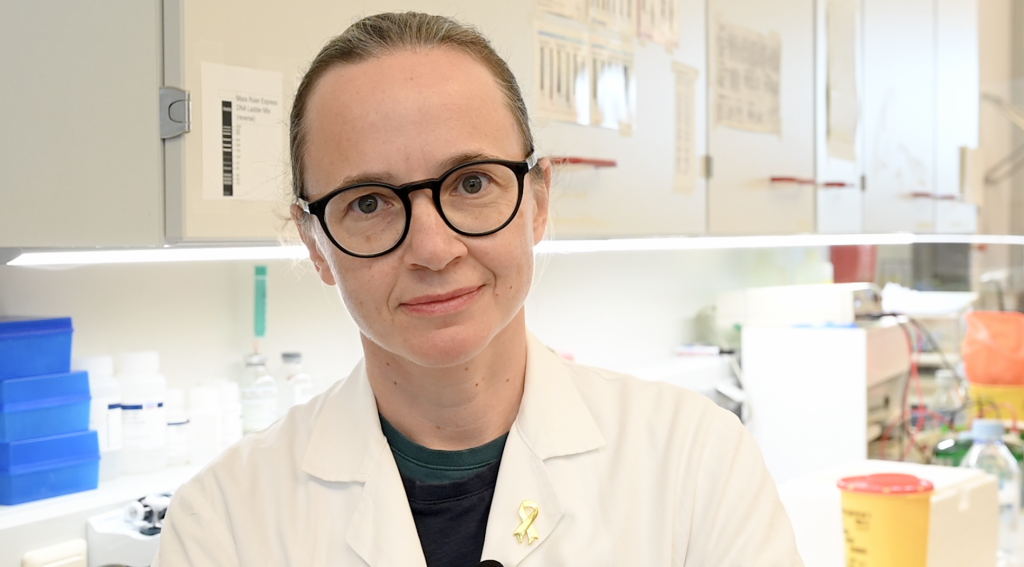How to make latest cancer therapies also available for children
(Vienna,9.12.2022) How adult drugs from the group of MAP kinase inhibitors can also be used in children with cancer in a standardized manner worldwide has now been outlined in a statement in the renowned European Journal of Cancer. The authors of this review are stakeholders from all relevant fields, including Caroline Hutter, MD, PhD, scientist at St. Anna Children’s Cancer Research Institute, clinician at St. Anna Children’s Hospital and expert in the rare pediatric cancer Langerhans cell histiocytosis (LCH). Her goal is to test the most effective and tolerable MAP kinase inhibitor in a clinical trial, thus enabling rapid market approval and availability for children.

In May of this year, pediatric oncologists, parent organizations, representatives of pharmaceutical companies and drug authorities gathered around the table in a pediatric strategy forum to form a plan for making a highly successful class of drugs used in adults available to children. They refer to therapy with agents that inhibit the signaling pathway of the so-called mitogen-activated protein kinase (MAPK) in cancer cells. This signaling pathway is often genetically altered, which means that it can be permanently active and thus promote tumor growth. It is therefore an important drug target in adults.
The meeting was organized by the international platform ACCELERATE – Therapeutic Innovations for Children and Adolescents with Cancer, in collaboration with the European Medicines Agency (EMA) with the participation of the Food and Drug Administration (FDA).
For adults only
The MAPK pathway can also be permanently activated in childhood cancers, e.g. Langerhans cell histiocytosis, childhood brain tumors and others. Currently, however, not a single MAPK inhibitor has been approved for children with LCH, although they have shown very high efficacy in so-called off-label use, that is, without approval by drug authorities.
Thus, the rapid development and evaluation of drug combination approaches based on a deep understanding of tumor biology is needed to improve response rates and address potential side effects. In addition, special attention must be paid to long-term sequelae in children. Moreover, in the case of brain tumors or metastases, high penetration of the blood-brain barrier by the drug is critical to its efficacy.
Urgent need for clinical trials in children
Currently, in children with cancer, it is not clear how MAPK inhibitors should be combined with the currently used drugs. Based on the off-label data it is likely that these inhibitors need to be combined with chemotherapy in order to actually cure the patients.
Thus, coordinated clinical trials are needed to determine the best possible treatment strategies with MAPK inhibitors in children. In doing so, the studies must be designed to meet all requirements for immediate approval after study completion.
Bring everyone to the same table: Involving all stakeholders from the start
The above-mentioned meeting finally resulted in a statement that was published in the European Journal of Cancer. Caroline Hutter sees this as an important step in the right direction: “What was special about this meeting was that all the different stakeholders sat around the table and worked together to solve the problem. Childhood cancer is rare. You therefore have to work together as constructively as possible right from the start and think about everything as early as possible. This is very different from adults. Parents were able to raise their concerns about possible long-term effects, and crucial advice came from the drug authorities on how to set up the trials so that they meet all the criteria for rapid drug approval,” she says. According to her, the next step for children with LCH or other appropriate cancers is now to jointly develop all-around “bulletproof” study protocols with MAPK inhibitors.
Publication:
Paediatric Strategy Forum for medicinal product development in mitogen-activated protein kinase pathway inhibitors: ACCELERATE in collaboration with the European Medicines Agency with participation of the Food and Drug Administration.
Eur J Cancer. 2022 Oct 14;177:120-142. Pearson AD, Allen C, Fangusaro J, Hutter C, Witt O, Weiner S, Reaman G, ……., Vassal G.
DOI: 10.1016/j.ejca.2022.09.036
About ACCELERATE:
https://www.accelerate-platform.org/
About Caroline Hutter:
DDr. Caroline Hutter (MD, PhD), is attending physician in pediatric oncology at the St. Anna Children’s Hospital and Principal Investigator at the St. Anna Children’s Cancer Research Institute, Vienna, Austria. After earning a MD from the Medical University in Vienna, Hutter obtained her PhD at Imperial Cancer Research Fund / Cancer Research UK in London, where she worked in the lab of Fiona Watt to investigate the role of integrins in stem cells. She then joined the lab of Meinrad Busslinger at the Research Institute of Molecular Pathology (IMP) in Vienna and trained in pediatrics at the Medical University of Vienna and the St. Anna Children’s Hospital. Her special interest lies in precision oncology, hard-to-treat cancers and histiocytoses. Her laboratory research focuses on the pathogenesis and treatment of Langerhans Cell Histiocytosis.
About the research group: